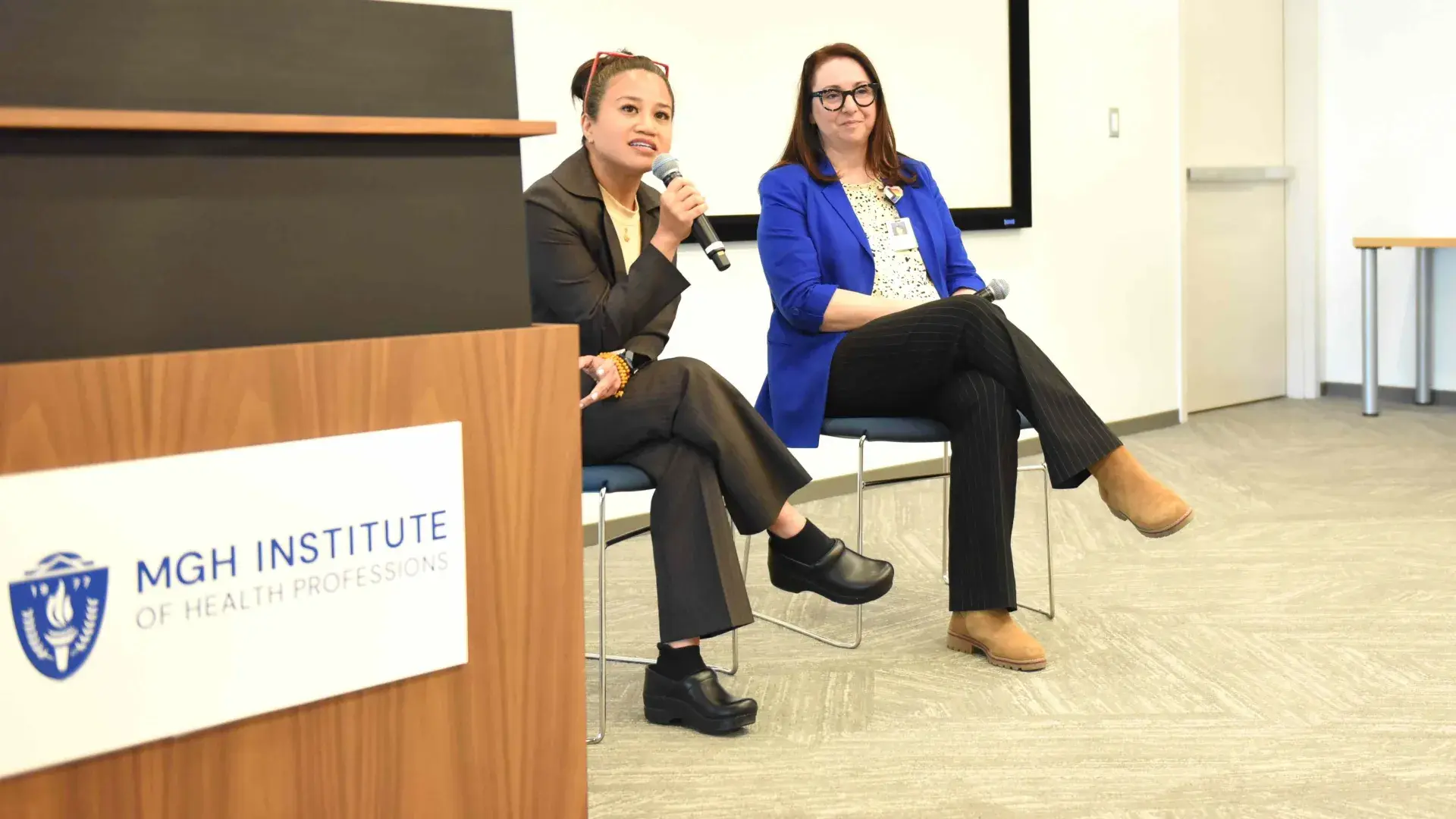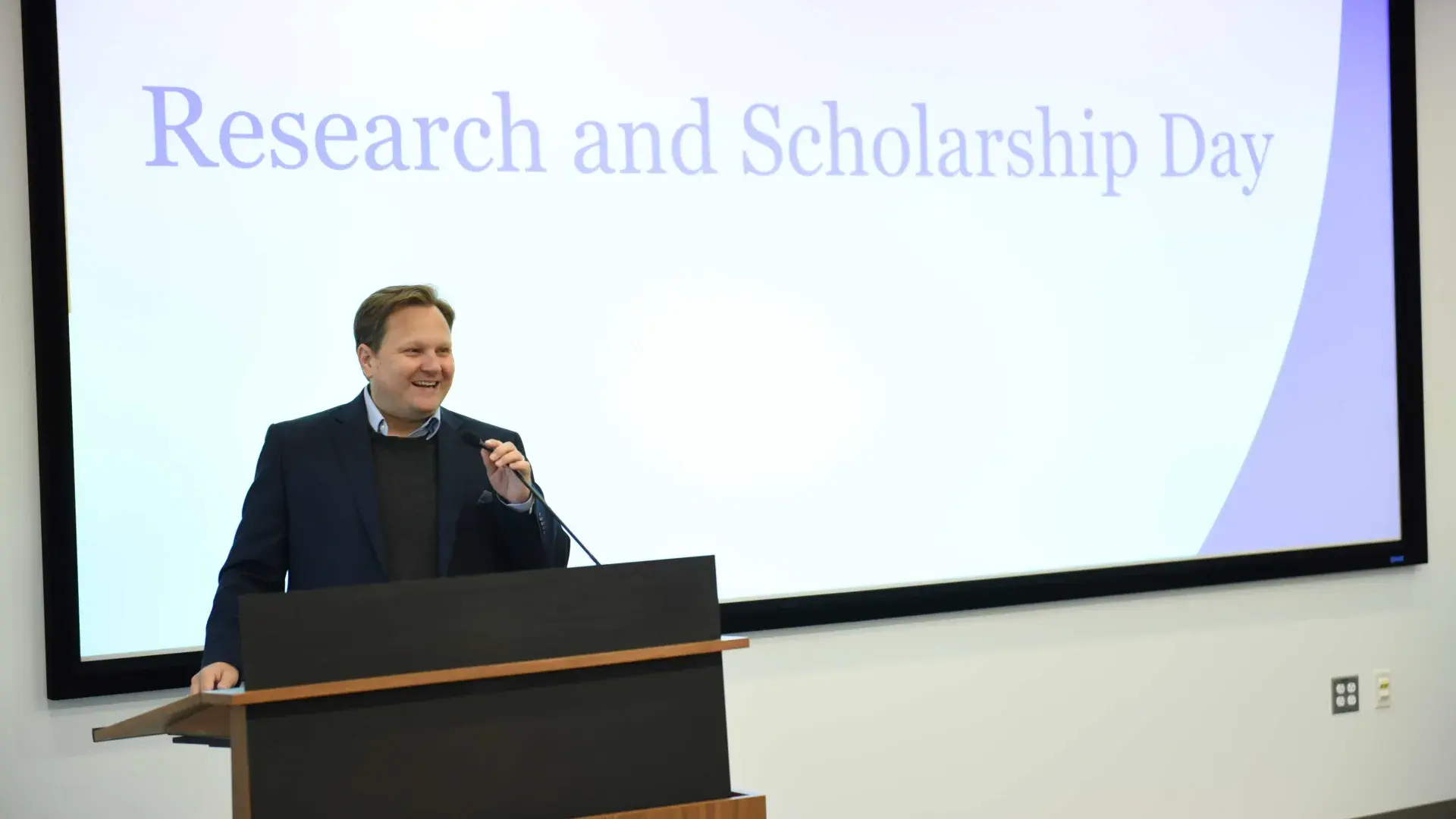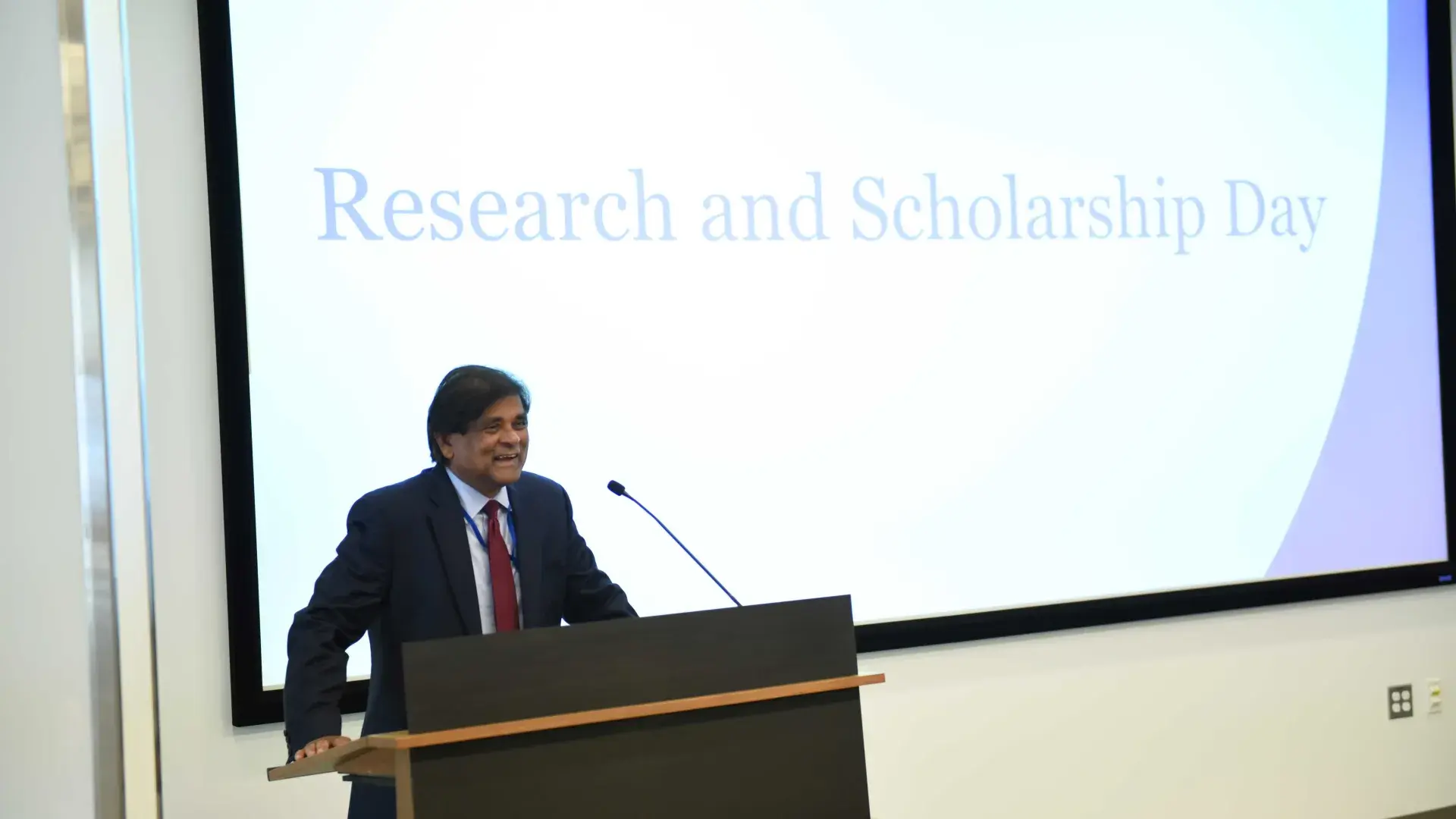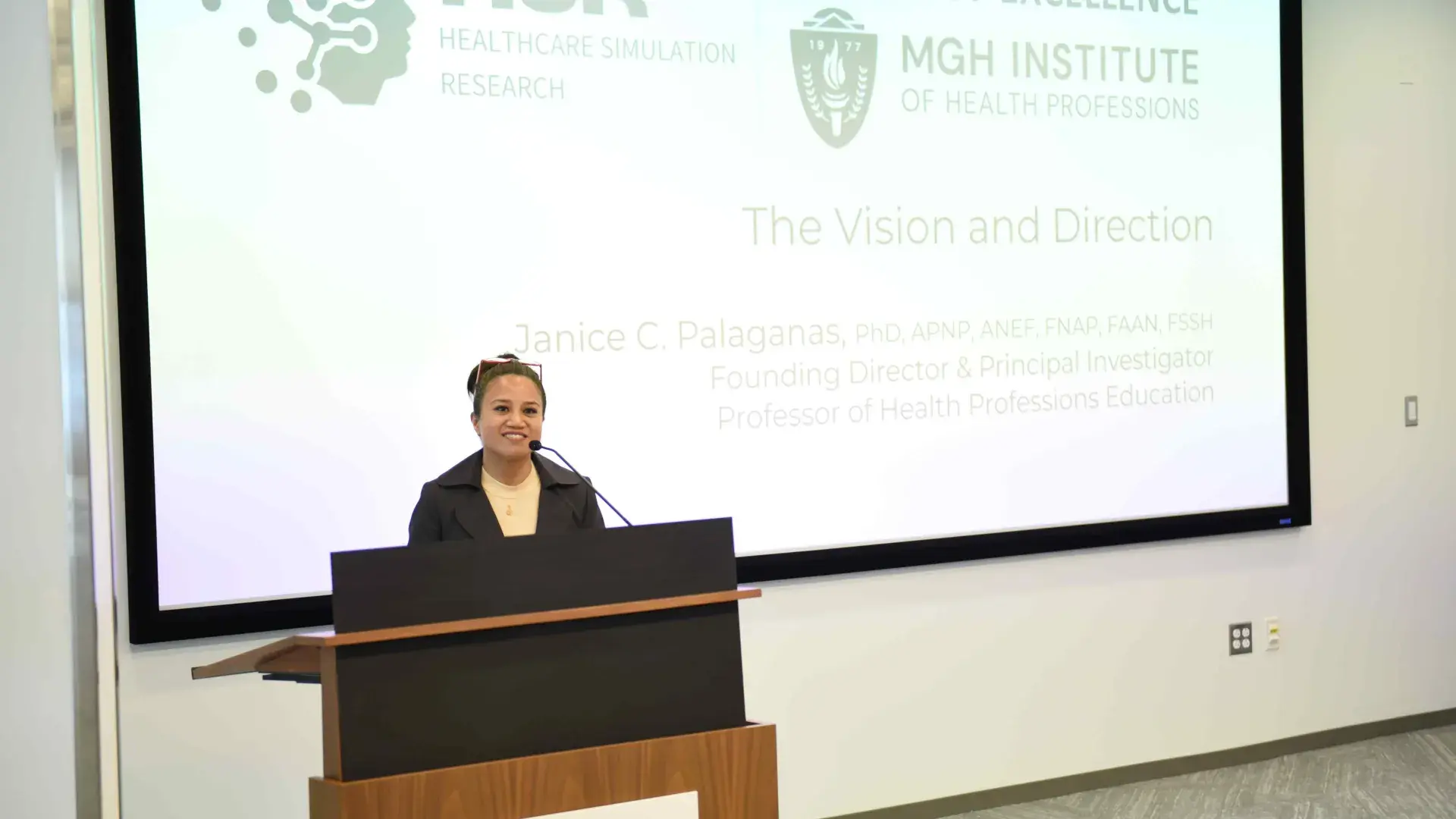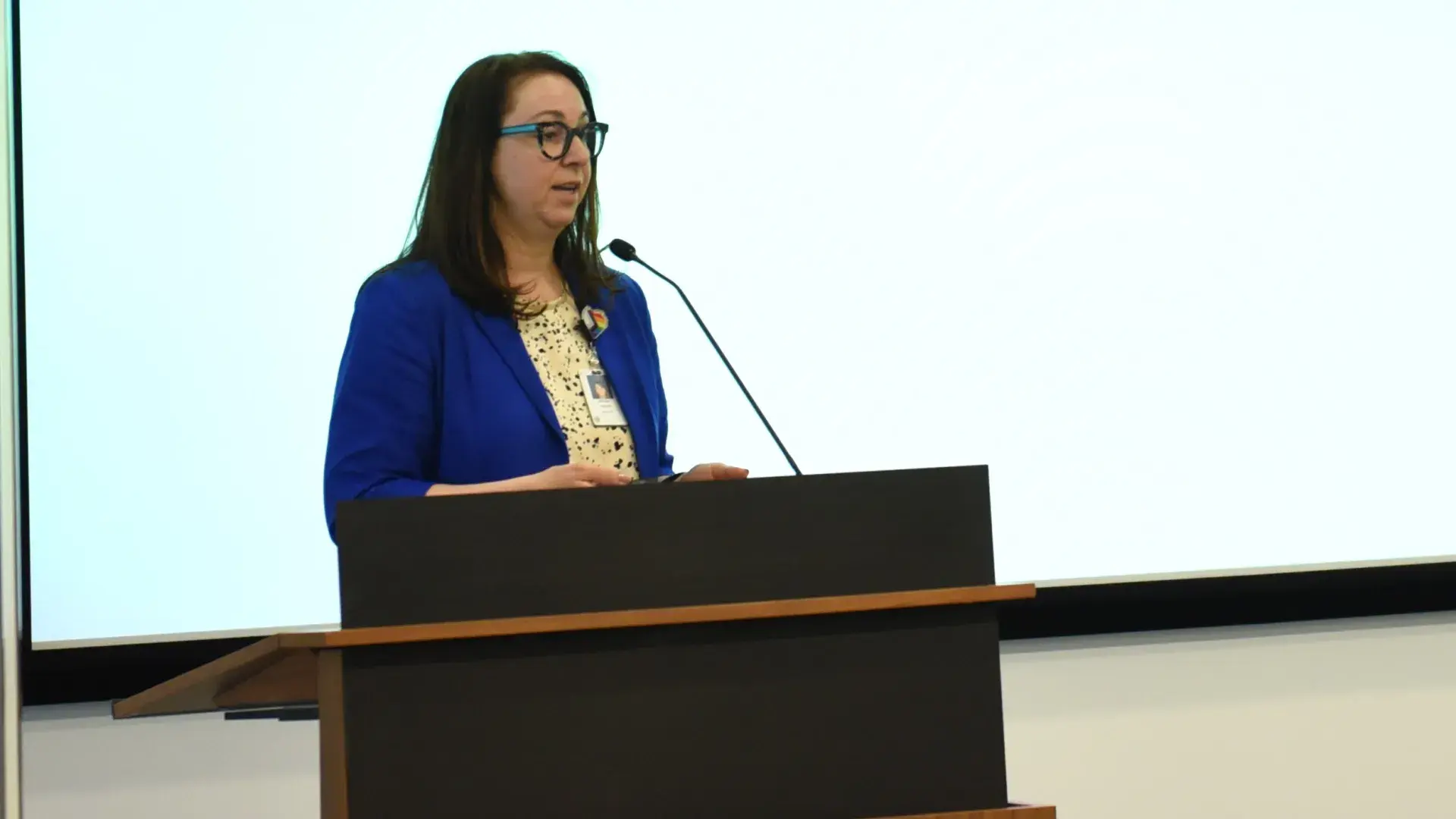
Annual Research and Scholarship Day focuses on continued growth and the creation of new centers of excellence
The faculty at the MGH Institute of Health Professions have a well-established history of exploring independently a wide variety of research approaches within specialized areas of the health professions. While some researchers informally and occasionally worked with colleagues, there hadn’t been an easy way for faculty with common interests to collaborate.
That now is changing with the January creation of two Centers of Excellence, which was the main topic of the school’s annual Research and Scholarship Day on April 25.
The event, held before a large gathering of faculty, staff, and students, focused on the school’s newest additions: a multi-million data-collection research center with state-of-the-art equipment to house many of the school’s 15 research labs, and two new topic-based initiatives: the Center of Excellence in Simulation Education Research, and the Center for Translational Research, Implementation Science, and Dissemination for Equity (cTIDE) that will allow IHP faculty from multiple disciplines to collaborate on developing ways to advance patient care.
In recent years, there have been three primary research clusters, Dr. Nara Gavini, the IHP’s associate provost for research, told the audience:
- Focus on Recovery: Emphasizing rehabilitation research
- Communication and Cognition: Exploring the connections between speech, language, autism, and the neurobiology of learning
- Healing and Treatment: Advancing interventions for stroke recovery
The school’s first center, the Tedy’s Team Center for Excellence in Stroke Rehabilitation, was established in 2023 with a $1 million grant provided by the non-profit started by former New England Patriots great Tedy Bruschi and his wife, Heidi. The linebacker recovered from a 2005 stroke with the assistance of Dr. Anne McCarthy Jacobson, an IHP physical therapy faculty member who assisted Bruschi recover at Spaulding Rehabilitation Hospital and eventually return to playing. This center brings together individual centers in the Sanders IMPACT Practice Center in which students overseen by faculty provide occupational therapy, physical therapy, and speech-language pathology services to clients who have had a traumatic brain injury.
Gavini told the audience how research has surged since the start of this decade. The total research portfolio has grown from around $18 million in 2020 to more than $45 million in 2023. In addition, the number of faculty publications in peer-reviewed journals has increased during that same time from 250 to 330 – 50% of which are co-published with researchers within the Mass General Brigham system – while the number of citations has grown to more than 7,000. Add to that the growth in collaborations with researchers within the Mass General Brigham system (including Mass General, Brigham & Women’s, and Spaulding) plus affiliations with Harvard, MIT, Yale, and Johns Hopkins, and it has produced a new level of achievement and accomplishment.
“It’s been four years of steady growth,” Gavini said. “Over the past several years, [IHP President] Paula Milone-Nuzzo and [Provost] Reamer Bushardt have wanted not only designated researchers but also all faculty to engage in scholarly activities. They have committed resources to establish new centers aimed at drawing more contributors and promoting transdisciplinary research.”
Sean Hennessey, the school’s chief communications officer, moderated a question-and-answer segment with Dr. Janice Palaganas, Director of the Center of Excellence in Healthcare Simulation Research, and Dr. Tiffany Hogan, Director of cTIDE.
Palaganas said her center’s mission is to generate research on how to use simulation and conduct simulation research more effectively, something that has lagged behind in research.
“The one critical need is that we have to grow our researchers,” she said. “We have to grow their skills as what’s being produced out there is not very good research. The biggest challenge is to create an environment in which information is shared so that we can keep building upon knowledge rather than reinventing the wheel.”
Within the center is the Research on Experiential-Based Education Lab (REBEL), which specializes in three research areas:
- Examining healthcare simulation methods
- Cognitive neuroscience of health professions feedback conversations
- Generative AI using healthcare simulation for assessment
REBEL will have post-doctoral fellowships and research scholar opportunities, as well as seed grants, beginning in 2025.
“For the last 10 years, I think we have really positioned the IHP to be a leader in healthcare simulation research,” she said, noting our position to be primarily due to the school’s Department of Health Professions Education that offers master’s and doctoral degrees in HPEd. “And over the last two years, we have really pushed that boundary and we now are being recognized as one of the leaders, if not the leader, with the creation of the new center.”
Hogan, who was one of the first full-time researchers hired by the Institute in 2013, directs the Speech and Language Literacy (SAiL) Lab where she has generated $10 million dollars in federal and private grants. For cTIDE, the initial grant funds came from former IHP provost Dr. Alex Johnson, and the local office of national accounting firm, RSM.
While Hogan said her center is at the beginning stages, she outlined several points of how it can reverse what she termed research-to-practice and practice-to-research gaps. And because it takes over 15 years for less than 15% of research to be implemented, the goal is to provide research that practitioners can use more quickly.
“The National Institutes of Health has realized this and they have put a priority on translational research,” she said. “If we measure the success of what we do based on evidence-based practice for our patients, only about 60% of the care that our patients receive qualifies as evidence-based practice. Translational science is focused on improving and reducing the gap between evidence and clinical practice that we see every day.
“So, the more aligned research is to practice, the more likely that that evidence base will take hold,” she continued. “This is really the crux of wanting to do work on translational science and coming together to make sure that the research is representing the practice realities and vice versa.”
Hogan, whose SAiL Lab focuses on the learning gaps in school children, said implementation science can be used in academic settings to help close the gap between better interventions and the reality of what can be done during the school day.
“For instance, one-on-one intervention four times a week may be best for outcomes but the schools we work with don’t have those resources,” she said, noting that the center could also look at improving strategies to increase the use of evidence-based practice. “The ultimate goal is to improve the outcomes for the patients we see.”
Do you have a story the Office of Strategic Communications should know about? If so, let us know
External funding is vital to the important work and research being conducted through these centers. If you are interested in making a donation to supoort the research, please contact Meagan Sheffield (masheffield [at] mghihp.edu (masheffield[at]mghihp[dot]edu)).
